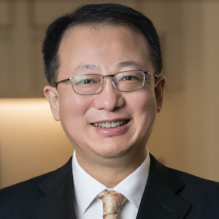Joshua Yuan
Department Chair
Washington University in St.Louis
Department of Energy, Environmental & Chemical Engineering
Next-generation Biorefining, Biomaterials, and Biomanufacturing for Sustainability and Decarbonization
Abstract
Sustainability and global climate change are major challenges facing our generation. Modern biorefining, renewable materials, and decarbonized biomanufacturing provide essential solutions to these challenges, yet substantial technological advancements are needed. For example, lignocellulosic biorefinery focuses on carbohydrate utilization, leaving lignin as an abundant waste. As one of the most abundant biopolymers and a major industrial waste, fungible lignin utilization is crucial to sustainability and decarbonization, yet is hindered by the limited understanding of the structure-property relationship of lignin chemistry and product properties. We have advanced such understanding to guide the process and material designs. First, we revealed that lignin processing into smaller molecular weight, monomer-containing, and hydroxyl group-enriched fractions will significantly improve the bioprocessibility. Based on the discovery, we designed a ‘plug-in’ module to transform pretreatment technologies into integrated biorefinery for efficient conversion of both carbohydrates and lignin. In particular, we integrated innovative biorefinery and microbial design to enable cost-effective and efficient lignin conversion into biodegradable plastics1. Second, we have discovered that lignin molecular weight, uniformity, linkage profile, and functional groups could impact the lignin biomaterials' properties. For example, the higher molecular weight, better uniformity, and more linear linkages could improve carbon material properties. The understanding has guided the design of a new type of lignin to achieve the highest reported tensile strength for lignin carbon fiber, empowering lightweight applications for emission reduction2. This new type of lignin can also promote the performance of plastic blends. Therefore, based on the fundamental understanding, we have designed processes to transform lignin into a precursor for broad biomaterial applications to promote sustainability and decarbonization.
Besides biorefining, algal carbon capture and utilization represent another opportunity for decarbonization. However, the algal bioproduct and biofuel commercialization was hindered by the low light penetration, higher harvesting and production costs. We have addressed the challenges by engineering a rapidly growing strain, Synechococcus elongates UTEX 2973 to empower low-cost harvest and continuous cultivation. We used two machine learning models to predict and simulate the light penetration and the growth rate, respectively. The integration of the two models allows us to predict maximized growth at the optical density, guiding the development of a semi-continuous cultivation (SAC) to substantially improve the cell growth rate. Furthermore, the high limonene productivity in engineered strains has created hydrophobic interactions among the cells, thereby leading to aggregation-based sedimentation (ABS). The ABS has delivered a low-cost harvesting method and empowered the cost-effective SAC. The ABS-empowered SAC has unleashed cyanobacterial growth potential to achieve 0.1g/L/hour biomass productivity and 0.2mg/L/hour limonene productivity in photobioreactors. The re-configuration of the SAC process in an outdoor pond system has achieved the record 43.3 g/m2/day biomass yield, which can translate into a minimum biomass selling price at $281 per ton3, empowering algal CCU.
Both biomass refining and algal bioproduction depend on photosynthesis, which has <1% efficiency. Recent team breakthroughs highlighted the possibility to substantially improve solar-to-molecule conversion rate via bypassing the Rubisco carbon fixation with electrocatalytic CO2RR (CO2 reduction reaction) and coupling it with bioconversion4. We systemically designed the electrocatalysis, the chem-bio interface, and microorganisms to enable efficient electro-microbial conversion with C2 (EMC2) intermediates1. The soluble C2 intermediates can facilitate rapid mass transfer, readily enter primary metabolism, have less toxicity, carry more energy and electrons, and serve as better molecular building blocks for many microorganisms4. The EMC2 design have achieved 6 and 8 times increase of microbial biomass productivity compared to C1 intermediate and hydrogen-driven routes, respectively. Moreover, the systematic design achieved integrated, continuous, and rapid microbial biomass and PHA production from CO2 with record-level productivity5. Overall, the EMC2 system could achieve 4.5% solar-energy-driven CO2 conversion to biomass, which is multiple times higher than the natural carbon conversion.
Bio
Joshua Yuan serves as the Lucy & Stanley Lopata Professor and Chair for the Department of Energy, Environmental and Chemical Engineering at Washington University in St. Louis. Previously, he was a faculty member at Texas A&M University since 2008 and was appointed as the Chair for Synthetic Biology and Renewable Products in 2018. He has served as the Director for the Synthetic and Systems Biology Innovation Hub since 2015. Dr. Yuan’s research focuses on carbon capture and utilization, renewable biomaterials, biomass processing and biorefining, as well as synthetic and systems biology. His group has developed various routes for carbon capture and conversion, including the algae-based and electro-microbial hybrid processes. He has been awarded four U.S. patents and has five pending. He has written more than 100 peer-reviewed journal articles, published in Chem, Matter, Nature Communications, Green Chemistry, Advanced Sciences, and PNAS, among others. He has won numerous awards and honors, including the Regional Solid Waste Planning Award and the Environmental Educator Award in 2018; the Excellence in Innovation Award from Texas A&M University System in 2017; and Gamma Sigma Delta Outstanding Graduate Student Award in 2007, among others. He is now a Fellow of Royal Society of Chemistry.
Wednesday, November 01, 2023

Joshua Yuan
Department Chair
Department of Energy, Environmental & Chemical Engineering
Washington University in St.Louis
- Time: 11:00 AM
- Location: 206 Furnas Hall